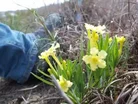Chile Develops New Plant-Based Technology for Mining Waste

Chilean researchers from the University of Santiago de Chile have developed a plant-based technology to combat effects of contaminants produced from mining production processes.
The technology, which is known as “phytostabilization,” involves the reduction of mobility of heavy metals in soil by growing plants with the ability to retain contaminants in mine waste. The roots of the plants absorb waste particles from mining production as well as eliminate the spread of waste particles by wind, which could affect certain ecosystems and human health.
According to Chilean researcher Claudia Ortiz, the new development is a ‘real alternative’ to other costlier and more aggressive processes currently implemented. Chile’s mining industry currently generates 300 million tons of mineral particles annually.
Field work has shown that Phytostabilization is efficient at lowering levels of Pb in a sand/Perlite mixture and low-level radionuclides may be stabilized. Studies also suggest that phytostabilization may reduce metal leaching by converting metals from a soluble oxidation state to an insoluble oxidation state.
The biotechnology also has the ability to enable “subsequent biomass production,” providing a possible revenue source for people in areas hit by mine closure.
The phytostabilization technology, which is used in a handful of Chilean mining operations including mines owned by Codelco, could benefit other mining operations around the world.
The new plant-based technology is being evaluated at mine sites in Bolivia, Colombia and Canada.



